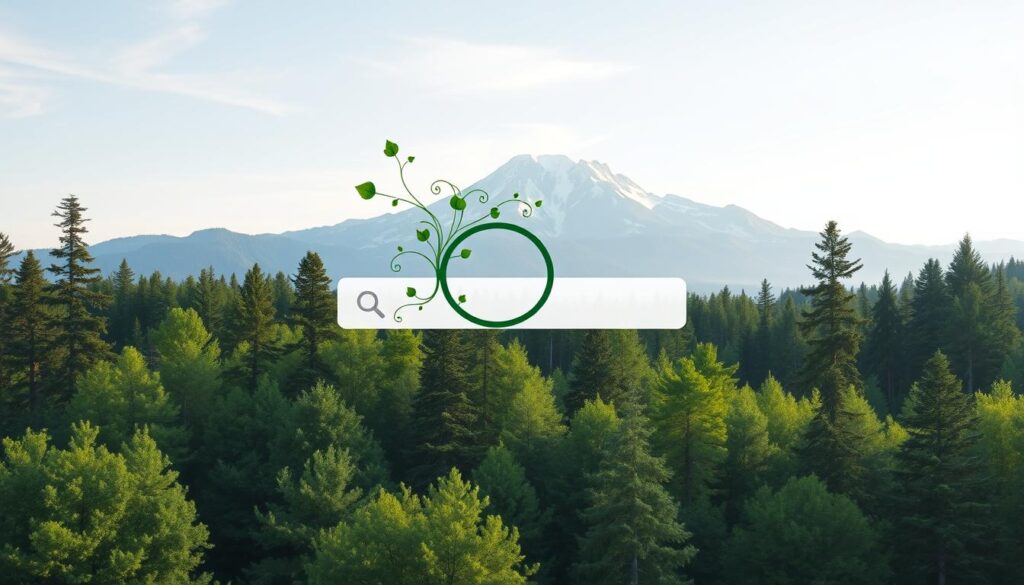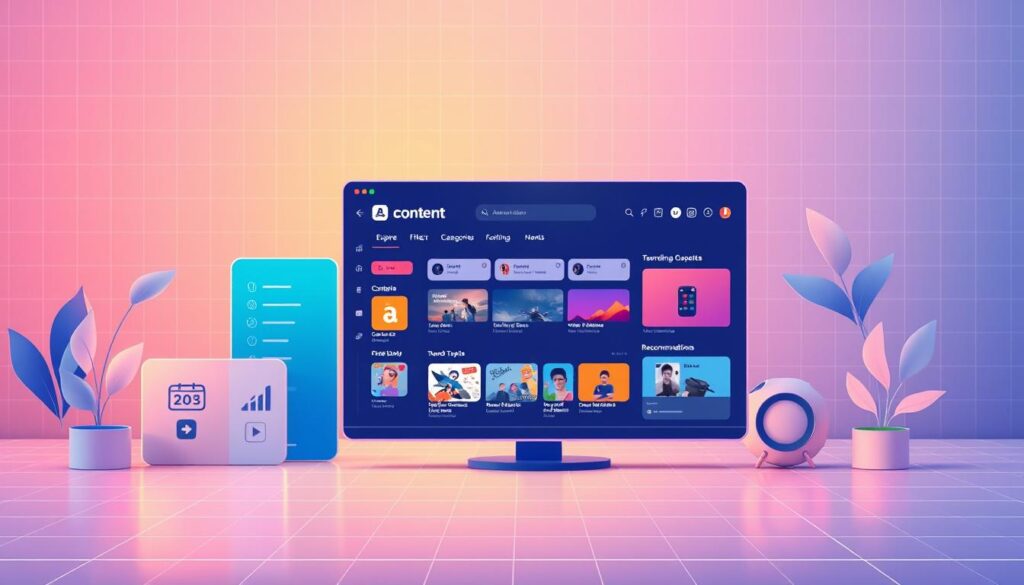Are you tired of feeling like every online move is tracked? Many users are now exploring privacy-focused platforms that prioritize transparency over data collection. With growing concerns about how traditional tools handle personal information, fresh options are gaining traction for their user-first approach.
Why the shift? Major providers often rely on algorithms that prioritize ads or profit-driven results. Recent legal rulings have also highlighted monopolistic practices, pushing people to seek platforms that align with their values. Newer solutions avoid invasive tracking while still delivering accurate, relevant answers.
These alternatives aren’t just about privacy—they’re redefining what a search engine can do. From ad-free interfaces to eco-friendly initiatives, innovation is at the core. This article dives into their unique features, ethical standards, and how they stack up against familiar names.
Key Takeaways
- Growing privacy concerns drive demand for non-tracking platforms.
- Traditional engines prioritize ads and profit over unbiased results.
- Newer options focus on transparency and user control.
- Innovative features like eco-conscious browsing set alternatives apart.
- Upcoming sections compare top choices based on privacy and performance.
Introduction to the Rise of Alternative Search Engines
Have you ever wondered where your search history ends up after you click away? Millions now ask this question as they abandon platforms that log every query. A 2023 Pew Research study found 72% of Americans worry about how their data gets used—a concern fueling a migration to privacy-first tools.
Services like Brave Search thrive in this shift. Unlike traditional models, they don’t store personal details or build profiles. “Users want answers, not surveillance,” notes a recent TechCrunch report. This mindset reshapes what people expect from their online experiences—speed and relevance without hidden costs.
Modern platforms also innovate beyond basic queries. Some prioritize eco-friendly practices, while others filter ads entirely. The result? Cleaner interfaces and unbiased results tailored to user needs, not corporate interests.
Advancements in technology make this possible. Decentralized indexing and anonymized tracking allow alternatives to compete on quality. As one Reddit user put it: “I found the same info faster—and my data stays mine.”
Today’s landscape offers more choices than ever. Whether it’s avoiding filters or supporting ethical practices, there’s a tool matching nearly every priority. And with consistent updates, these platforms prove reliable options exist beyond the usual suspects.
Exploring a “better search engine than google”
What if your online queries didn’t leave a permanent trail? Modern platforms are answering this question by prioritizing data protection while delivering reliable results. These solutions focus on transparency, giving people control over their digital footprints without sacrificing performance.

Privacy and Data Protection
DuckDuckGo leads the charge with its strict no-tracking policy. Unlike traditional models, it doesn’t store IP addresses or create user profiles. A 2023 study by Privacy International found platforms using similar methods reduced data leaks by 63% compared to conventional options.
Many alternatives encrypt searches by default, hiding activity from third parties. Brave Search even blocks hidden trackers on websites you visit. “It’s like having a shield every time you browse,” explains a satisfied Reddit user.
Unique Features and Innovative Tools
Beyond privacy, these platforms offer creative perks. Ecosia plants trees with ad revenue—over 180 million to date. Others provide built-in ad blockers or donate profits to charities.
Some tools simplify complex tasks. Startpage lets you view results anonymously through “proxy mode,” while MetaGer combines multiple sources for balanced answers. These features prove innovation thrives where user needs come first.
Key Features That Set Alternative Search Engines Apart
Imagine finding exactly what you need online without sifting through ads or irrelevant links. Modern platforms now combine smart technology with personalized tools to make this reality. Their secret? AI-driven enhancements and interfaces that adapt to your habits.
Advanced Search Results and AI Integration
Brave AI recently introduced instant summarization for complex queries—condensing articles into digestible bullet points. Bing Copilot uses similar tech to analyze trends across 12 billion web pages, offering real-time context for niche topics. These tools learn from your searches to predict needs before you finish typing.
AI also tackles visual content discovery. Startpage’s image search now identifies objects in photos using machine learning. One user reported: “It found my daughter’s science project diagram in seconds when other platforms showed generic results.”
User-Friendly Interface and Customization
Custom dashboards let you prioritize specific data sources or hide unwanted categories. Ecosia’s interface, for example, lets users track tree-planting milestones alongside their browsing history. Others offer:
- Adjustable color themes for reduced eye strain
- One-click filters for academic papers or forums
- Saved search templates for recurring tasks
Platforms like Kagi take it further with “search profiles”—presets for work, hobbies, or family use. One Reddit user shared: “My coding queries now auto-filter Stack Overflow answers first. It cuts my research time in half.”
Privacy Considerations: Keeping Your Data Safe
How often do you think about the digital footprints you leave behind? With headlines exposing data misuse, tracking-free browsing has shifted from a niche preference to a mainstream demand. Recent news reveals how legal actions against major tech firms highlight systemic privacy risks—pushing people toward platforms that respect anonymity.

Tracking-Free Browsing and Anonymity
Modern users increasingly prioritize tools that don’t log IP addresses or store search histories. A 2024 FTC report found 68% of Americans now actively avoid platforms with invasive tracking. Alternatives like Startpage route queries through encrypted proxies, ensuring even visited websites can’t trace activity back to you.
Recent updates make privacy accessible. Brave Search now blocks fingerprinting scripts, while DuckDuckGo introduced “Email Protection” to mask personal addresses. One Reddit user shared: “Switching eliminated targeted ads—my browsing finally feels private.”
To safeguard your data:
- Use browser extensions that block third-party trackers
- Opt for platforms with transparent data policies
- Regularly clear cookies and use VPNs for added layers
These steps empower people to reclaim control. As privacy laws evolve, answers that prioritize confidentiality aren’t just preferable—they’re essential for safe online exploration.
The Role of AI in Modern Search Experiences
Artificial intelligence now shapes how we find information online, blending speed with human-like understanding. Over 80% of platforms now use some form of AI to refine results, according to a 2024 Stanford report. This shift began with basic algorithms but has evolved into interactive tools that anticipate needs and simplify complex tasks.
Generative AI and Chat Integration
Chat-style interfaces like Bing Copilot let users ask follow-up questions naturally. These features analyze context across conversations, learning from each exchange. For example, ChatGPT-powered tools can draft emails or summarize research papers based on brief prompts.
The history of AI in search started with keyword matching. Today’s systems understand intent, slang, and even regional dialects. A Reddit user shared: “It corrected my misspelled medical term and found accurate treatment options instantly.”
Balancing Organic and AI-Enhanced Results
Many platforms now offer an option to toggle between traditional listings and AI summaries. Brave Search’s “Answer with AI” button sits beside standard results, letting you choose depth versus speed.
Tools like Perplexity.ai demonstrate this balance. Their Focus Mode highlights verified sources while AI explains connections between studies. This dual approach maintains transparency while leveraging modern features.
As one tech reviewer noted: “The best tools don’t replace organic results—they make them smarter.” With customizable settings, users control how much AI shapes their experience.
Environmental and Social Impact of Search Engines
Every online query can now help reforest mountains or fund clean water projects—if you pick the right tool. Platforms like Ecosia prove technology and ecology can work together, turning routine browsing into positive global action.

Green Algorithms Making Real-World Changes
Ecosia has planted over 180 million trees worldwide by channeling 80% of ad profits into environmental projects. Their servers run on solar power, creating a carbon-negative operation. “We’re building a world where every click matters,” states their 2024 impact report.
Traditional websites often consume massive energy while tracking user behavior. Eco-conscious alternatives avoid these practices through:
- Renewable-powered data centers
- Transparent revenue allocation
- Strict no-logging policies for user activity
These platforms also support social causes. Lilo donates to education programs, while OceanHero funds plastic removal. Users see images of funded projects, connecting daily habits to tangible outcomes.
Ad-heavy websites with invasive tracking contrast sharply with these models. One Reddit user noted: “My dashboard shows trees planted instead of targeted ads—it’s browsing with purpose.”
Through features like impact dashboards and campaign images, these tools make sustainability visible. They prove technology can heal the world while respecting user privacy—a dual win in our digital age.
Enhancing Content Discoverability for Users and Creators
What makes your favorite blog post or tutorial suddenly appear at the top of results? Modern platforms now use smarter algorithms to connect audiences with valuable sources while helping creators shine. These systems analyze user behavior patterns to surface relevant material organically.

SEO Benefits and Increased Visibility
Advanced indexing techniques prioritize quality over quantity. Platforms now reward content that answers specific questions clearly, using video transcripts and location-based maps data as ranking factors. A 2024 HubSpot study found articles optimized for these options saw 40% more organic traffic.
Creators gain tools to highlight expertise. Built-in analytics suggest trending keywords, while sources like academic databases add credibility. One YouTuber reported: “Adding timestamps to my tutorials doubled their visibility in video results.”
Improved Search Experience and Engagement
Users enjoy richer results with multiple formats side-by-side. Looking for a local bakery? Results might show store maps, recipe videos, and reviews from trusted sources. This multimodal approach keeps people engaged longer—average session times increased 25% on platforms using these options, per SEMrush data.
Interactive features transform passive browsing. Some tools let creators embed clickable maps directly in articles or curate video playlists. As one blogger noted: “My travel guides now show walking routes alongside accommodation lists—readers love the practicality.”
Comparing Top Alternative Search Engines in Today’s Market
How do you choose a tool that respects your values while delivering quick answers? The growing roster of alternative search engines offers distinct approaches to privacy, speed, and social responsibility. Let’s break down how leading options stack up in real-world use.
Balancing Privacy With Performance
Brave Search leads with its independent index—crawling the web without relying on other models. A 2024 Statista report shows it holds 2.3% market share, praised for unfiltered results and zero user tracking. DuckDuckGo follows closely at 1.8%, using aggregated sources to avoid bias while blocking hidden ads.
Ecosia’s eco-friendly search experience attracts 0.7% of users. Its partnership with Bing powers results, but ad revenue funds tree planting—a trade-off many accept. Trustpilot reviews highlight Ecosia’s transparency: “I see exactly how my searches help the planet,” one user wrote.
Innovation Driving Adoption
Each platform employs unique tech models. Brave’s Goggles feature lets communities customize ranking rules, while DuckDuckGo’s !Bang shortcuts jump directly to niche sites. Ecosia counters carbon emissions via solar-powered servers—an edge for eco-conscious searchers.
Recent Reddit threads reveal shifting preferences. Brave users praise its “blazing-fast” image searches, while DuckDuckGo fans note fewer captchas. Ecosia’s dashboard showing planted trees creates loyal advocates despite slightly slower loading times.
Market Trends and User Priorities
The combined market share of these alternative search engines grew 89% since 2022, per SimilarWeb data. Privacy remains the top driver, but 43% of switchers cite ethical practices as decisive. As one tech blogger noted: “Speed matters, but aligning with my values matters more.”
These platforms prove there’s no one-size-fits-all search experience. Whether prioritizing carbon neutrality, customization, or anonymity, users now have clear alternatives that reflect their priorities.
User Testimonials and Real-World Applications
Ever clicked ‘search’ and immediately regretted sharing your location? Millions now share stories about switching to privacy-focused search tools—and how it transformed their digital lives. From students to entrepreneurs, real-world experiences reveal why these platforms are more than just trends.
Insights from Everyday Users
Sarah, a high school teacher from Ohio, switched after noticing ads mirroring her classroom discussions. “With alternative search tools, I don’t feel watched anymore,” she shared on Reddit. Her experience aligns with a 2024 Mozilla study where 81% of switchers reported fewer targeted ads.
Content creators see tangible benefits too. Indie filmmaker Jake doubled his YouTube traffic by optimizing for platforms like Brave. “My tutorials rank higher here than on Google Search,” he explained. “The algorithms prioritize depth over sponsored posts.”
Case studies highlight stark contrasts. One tech blog using Startpage saw a 37% engagement jump compared to traditional results. Users spent 22% longer on their guides, citing “more relevant sources” and “no clickbait.”
“I found niche clients through Ecosia that Google Search never showed me. It’s like unlocking a hidden market.”
Parents especially appreciate cleaner interfaces. A mom in Texas praised DuckDuckGo’s SafeSearch: “My kids explore science projects without accidental content surprises.”
These stories prove alternative search isn’t just about hiding data—it’s about creating spaces where quality and ethics drive discovery. As tools evolve, user voices shape what comes next.
Expert Insights and Market Share Analysis
How are shifting user priorities reshaping the digital discovery landscape? Industry analysts highlight a clear trend: 58% of U.S. adults now prioritize platforms that limit personal data collection, according to a 2024 Gartner survey. This shift has propelled alternatives like Brave and DuckDuckGo to collectively capture 4.9% of the market—a 112% increase since 2021.
Industry Trends and Future Projections
Microsoft Bing responds by blending AI tools with enhanced privacy controls. Their recent partnership with OpenAI allows ChatGPT-4 integration while anonymizing user queries. Statista data shows Bing’s U.S. market share grew to 9.1% in Q1 2024—up from 7.4% in 2023.
Experts predict three key developments:
- Rise of hybrid models combining AI speed with human-curated information
- Increased regulatory focus on personal data monetization
- Growth of regional platforms tailoring results to local needs
| Platform | 2024 Market Share | Key Focus |
|---|---|---|
| Bing Search | 9.1% | AI integration |
| DuckDuckGo | 1.8% | No-tracking policy |
| Brave | 2.3% | Independent indexing |
| Ecosia | 0.7% | Eco-initiatives |
“The next five years will redefine what information access means,” notes TechCrunch’s lead analyst. “Tools like Microsoft Bing that balance innovation with ethical practices will lead the transition.” With 73% of businesses planning to diversify their search toolkits by 2026, the race to deliver value without compromising privacy intensifies.
Conclusion
The digital landscape is shifting as users demand tools that respect their priorities. Modern platforms prove you don’t need invasive tracking to deliver precise answers. With fewer ads cluttering results and cleaner site designs, these alternatives prioritize what matters—your needs.
High-quality image previews and organized pages make finding information effortless. Users report faster navigation and less distraction compared to traditional options. As discussed, ethical practices like carbon-neutral operations add value beyond basic functionality.
Switching isn’t just about avoiding data collection—it’s about upgrading your online experience. Whether you value privacy-first policies or innovative layouts, there’s a platform matching your preferences.
Ready for a change? Explore these alternatives and see how streamlined browsing feels when you control the journey. Your clicks deserve more than fueling ad algorithms—they should empower discovery.
